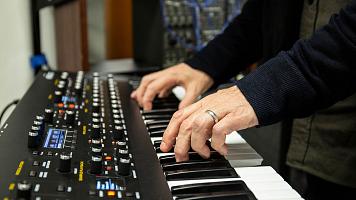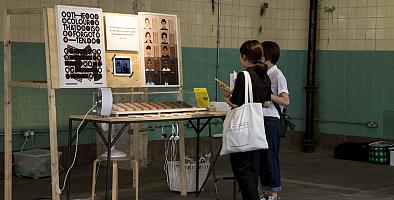MA
Creative & Cultural Entrepreneurship: Music Pathway
Content navigation menu
Why study MA Creative & Cultural Entrepreneurship: Music Pathway at Goldsmiths
This programme allows you to develop the business/entrepreneurial skills and attributes to commercialise on your creative and cultural practices and/or knowledge.
- The Music Pathway of the MA Creative and Cultural Entrepreneurship allows you to build on a historical and theoretical understanding of cultural and creative industries and the development of a cultural economy to create your own creative initiatives, which might be research-based, policy-based, practice-based, or a combination of any or all of these.
- The MA will be taught in partnership by a number of departments within Goldsmiths and with key individuals and organisations in the creative and cultural industries sector.
- Our collective approach is to integrate entrepreneurship within the development of creative practices and to take a ‘creative’ approach to the development of new businesses and the infrastructure that supports them.
Contact the department
If you have specific questions about the degree, contact the Admissions Tutor.
Length
15 months full-time or 27 months part-time
Fees
Home - full-time: £12520
Home - part-time: £6260
International - full-time: £23660
Departments
What you'll study
The programme contains taught modules and a further dissertation/portfolio component.
Attendance is mandatory for all taught sections of the programme. To encourage collaborative learning we try to teach all students together wherever possible, irrespective of their particular pathway.
| Module title | Credits |
|---|---|
| Theories of Capital | 30 credits |
| Creative Practice | 30 credits |
| Entrepreneurial Modelling | 30 credits |
| Methods and Approaches of Critical Analysis into Cultural Entrepreneurship | 15 credits |
| Business of Creative & Social Enterprises | 30 Credits |
| or | |
| Industry Placement | 30 credits |
| Dissertation or Project Portfolio plus reflective analysis | 75 credits |
For the Creative Practice module, you will choose modules up to 30 credits from a list of optional modules provided by the Department of Music annually.
Note about optional modules (if available): The above is indicative of the typical modules offered, but is not intended to be construed or relied on as a definitive list of what might be available in any given year. The module content and availability is subject to change.
Teaching style
We recognise the importance of supporting your learning with high-quality teaching on a predominantly group seminar/workshop basis with significant levels of individual tutorial support, particularly for independent projects.
A significant amount of the learning will be delivered though peer-to-peer learning, problem-solving workshops, group projects and activities that are designed to develop your individual communication skills and an experience similar to that of the workplace environment, as most organisations in the sector work in task-based teams.
We ensure that the assessments are situated in both the learning and application of learning in future careers.
What our students say



Careers
The programme will enable those who have previously studied an area of creative study/practice to start a career developing a business arising from an existing or new creative practice.
This may relate directly to a 'product' or 'process' arising from you own practice or to a form of 'expertise', 'consultancy' or 'knowledge'.
The programme will also equip those who wish to work within organisations that develop the infrastructure and environment for new creative businesses with the capacity to flourish in a variety of contexts.
Skills
You can expect to develop an independence and integrity in developing creative ideas.
You will be able to apply entrepreneurial approaches to creative projects and demonstrate an understanding of different business models to establish a creative enterprise.
You will also develop team-working and leadership skills, and effective business and communication skills.
Entry requirements
You should have (or expect to be awarded) an undergraduate degree of at least upper second class standard in a relevant/related subject.
Evidence of some engagement with or experience of contemporary music making as a performer or creative artist is desirable, whether in classical, popular or world music genres, together with some understanding of management/administration issues as they particularly relate to music and musicians.
We also welcome applications from students who are practising musicians who may wish to enhance their entrepreneurial skills, or develop a specific music-related company or business.
Students who have completed up to 90 credits (not including final 60-credit projects or dissertations) of a comparable degree at another university can apply for recognition of prior learning status as part of their application for a place on the programme, where such credits are carried forward into your study at Goldsmiths.
International qualifications
We accept a wide range of international qualifications. Find out more about the qualifications we accept from around the world.
If English isn’t your first language, you will need an IELTS score (or equivalent English language qualification) of 6.5 with a 6.5 in writing and no element lower than 6.0 to study this programme. If you need assistance with your English language, we offer a range of courses that can help prepare you for postgraduate study.
Fees and funding
Annual tuition fees
These are the PG fees for students starting their programme in the 2024/2025 academic year.
- Home - full-time: £12520
- Home - part-time: £6260
- International - full-time: £23660
If your fees are not listed here, please check our postgraduate fees guidance or contact the Fees Office, who can also advise you about how to pay your fees.
It’s not currently possible for international students to study part-time under a student visa. If you think you might be eligible to study part-time while being on another visa type, please contact our Admissions Team for more information.
If you are looking to pay your fees please see our guide to making a payment.
Funding opportunities
Explore the Goldsmiths scholarships finder to find out what funding you may be eligible for.
If you are a UK student you may be eligible for a postgraduate loan.
Meanwhile our Careers Service can also offer advice on finding work during your studies.
BME Music Scholar's Fee Waiver
This full tuition fee waiver aims to support a Black, Asian, and minority ethnic music student who intends to progress through postgraduate study and into an academic research position. Find out more about the BME Music Scholar's Fee Waiver.
Paying your fees
Find out about paying your tuition fees.
Additional costs
In addition to your tuition fees, you'll be responsible for any additional costs associated with your course, such as buying stationery and paying for photocopying. You can find out more about what you need to budget for on our study costs page.
There may also be specific additional costs associated with your programme. This can include things like paying for field trips or specialist materials for your assignments. Please check the programme specification for more information.
How to apply
You apply directly to Goldsmiths using our online application system.
To complete your application, you will need to have:
- Details of your academic qualifications
- The email address of your referee who we can request a reference from, or alternatively a copy of your academic reference
- Copies of your educational transcripts or certificates
- A personal statement
- A one-paragraph elevator pitch for an entrepreneurial business idea that you plan to develop through the course. This is not a business plan, but a brief paragraph that clearly and concisely expresses your core entrepreneurial idea. You can submit your elevator pitch as a document or as audio/video. Please note that there is a file size limit of 20MB on our website but we can accept your audio/video hosted online if you provide a link to this in your application.
When applying, please specify your preferred pathway i.e. Music.
You must demonstrate in your written application and in interview that you have a capacity for creative and cultural entrepreneurship, and that you are able to meet the intellectual demands of the programme.
You'll be able to save your progress at any point and return to your application by logging in using your username/email and password.
When to apply
We accept applications from 1 October to 30 June for students wanting to start the following September. When applying, please specify your preferred pathway.
We encourage you to complete your application as early as possible, even if you haven't finished your current programme of study. It's very common to be offered a place that is conditional on you achieving a particular qualification.
Late applications will only be considered if there are spaces available.
If you're applying for funding, you may be subject to an earlier application deadline.
Selection process
Admission to many programmes is by interview, unless you live outside the UK. Occasionally, we'll make candidates an offer of a place on the basis of their application and qualifications alone.
Further guidance
Read our guide to applying for a postgraduate degree at Goldsmiths.





